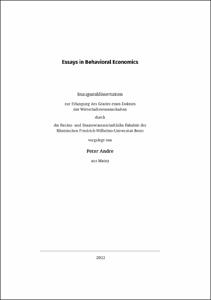Andre, Peter: Essays in Behavioral Economics. - Bonn, 2022. - Dissertation, Rheinische Friedrich-Wilhelms-Universität Bonn.
Online-Ausgabe in bonndoc: https://nbn-resolving.org/urn:nbn:de:hbz:5-65399
Online-Ausgabe in bonndoc: https://nbn-resolving.org/urn:nbn:de:hbz:5-65399
@phdthesis{handle:20.500.11811/9597,
urn: https://nbn-resolving.org/urn:nbn:de:hbz:5-65399,
author = {{Peter Andre}},
title = {Essays in Behavioral Economics},
school = {Rheinische Friedrich-Wilhelms-Universität Bonn},
year = 2022,
month = feb,
note = {This dissertation revolves around two themes: individuals' perceptions of reality and their beliefs about what characterizes a good, fair, and just world. It presents four independent research papers. Chapter 1 ("Shallow Meritocracy") focuses on people's fairness views. Meritocracies aspire to reward hard work but promise not to judge individuals by the circumstances into which they were born. However, the choice to work hard is often shaped by circumstances. I show that people's merit judgments are insensitive to circumstances' effect on choice. In an experiment, US participants judge how much money workers deserve for the effort they exert. Unequal circumstances discourage some workers from working hard. Nonetheless, participants hold disadvantaged workers responsible for their choices. Participants reward the effort of disadvantaged and advantaged workers identically, regardless of the circumstances under which choices are made. Chapter 2 ("Subjective Models of the Macroeconomy") investigates people's mental "models" of how the macroeconomy works. The study measures beliefs about the effects of hypothetical macroeconomic shocks on unemployment and inflation. It finds that beliefs are widely dispersed. This even holds for beliefs about the directional effects of shocks. Moreover, there are large differences in the average beliefs between households and experts. Chapter 3 ("Fighting Climate Change: The Role of Norms, Preferences, and Moral Values") documents that people in the US underestimate the prevalence of climate-friendly behaviors and norms among their fellow citizens. Moreover, providing respondents with correct information causally raises their willingness to fight climate change, measured through an incentivized donation decision, as well as individual support for climate policies. The final Chapter 4 ("What's Worth Knowing?") raises the question of what is worth knowing and worth studying in economics. Since there is no clear, scientific, or objective response to this question, researchers are forced to retreat to their gut feeling, instincts, and personal value judgments. The fourth chapter aims to document these judgments and analyzes the views of almost 10,000 academic economists from all fields and ranks of the profession. The chapter describes three main results of the survey. First, economists' opinions are substantially heterogeneous. Second, most researchers are dissatisfied with economics' current research topics and objectives. Third, on average, respondents think economic research should become more policy-relevant, multidisciplinary, risky and disruptive, and pursue more diverse topics. The results, thus, suggest that economics as a field does not appreciate and work on what economists collectively prefer.},
url = {https://hdl.handle.net/20.500.11811/9597}
}
urn: https://nbn-resolving.org/urn:nbn:de:hbz:5-65399,
author = {{Peter Andre}},
title = {Essays in Behavioral Economics},
school = {Rheinische Friedrich-Wilhelms-Universität Bonn},
year = 2022,
month = feb,
note = {This dissertation revolves around two themes: individuals' perceptions of reality and their beliefs about what characterizes a good, fair, and just world. It presents four independent research papers. Chapter 1 ("Shallow Meritocracy") focuses on people's fairness views. Meritocracies aspire to reward hard work but promise not to judge individuals by the circumstances into which they were born. However, the choice to work hard is often shaped by circumstances. I show that people's merit judgments are insensitive to circumstances' effect on choice. In an experiment, US participants judge how much money workers deserve for the effort they exert. Unequal circumstances discourage some workers from working hard. Nonetheless, participants hold disadvantaged workers responsible for their choices. Participants reward the effort of disadvantaged and advantaged workers identically, regardless of the circumstances under which choices are made. Chapter 2 ("Subjective Models of the Macroeconomy") investigates people's mental "models" of how the macroeconomy works. The study measures beliefs about the effects of hypothetical macroeconomic shocks on unemployment and inflation. It finds that beliefs are widely dispersed. This even holds for beliefs about the directional effects of shocks. Moreover, there are large differences in the average beliefs between households and experts. Chapter 3 ("Fighting Climate Change: The Role of Norms, Preferences, and Moral Values") documents that people in the US underestimate the prevalence of climate-friendly behaviors and norms among their fellow citizens. Moreover, providing respondents with correct information causally raises their willingness to fight climate change, measured through an incentivized donation decision, as well as individual support for climate policies. The final Chapter 4 ("What's Worth Knowing?") raises the question of what is worth knowing and worth studying in economics. Since there is no clear, scientific, or objective response to this question, researchers are forced to retreat to their gut feeling, instincts, and personal value judgments. The fourth chapter aims to document these judgments and analyzes the views of almost 10,000 academic economists from all fields and ranks of the profession. The chapter describes three main results of the survey. First, economists' opinions are substantially heterogeneous. Second, most researchers are dissatisfied with economics' current research topics and objectives. Third, on average, respondents think economic research should become more policy-relevant, multidisciplinary, risky and disruptive, and pursue more diverse topics. The results, thus, suggest that economics as a field does not appreciate and work on what economists collectively prefer.},
url = {https://hdl.handle.net/20.500.11811/9597}
}






